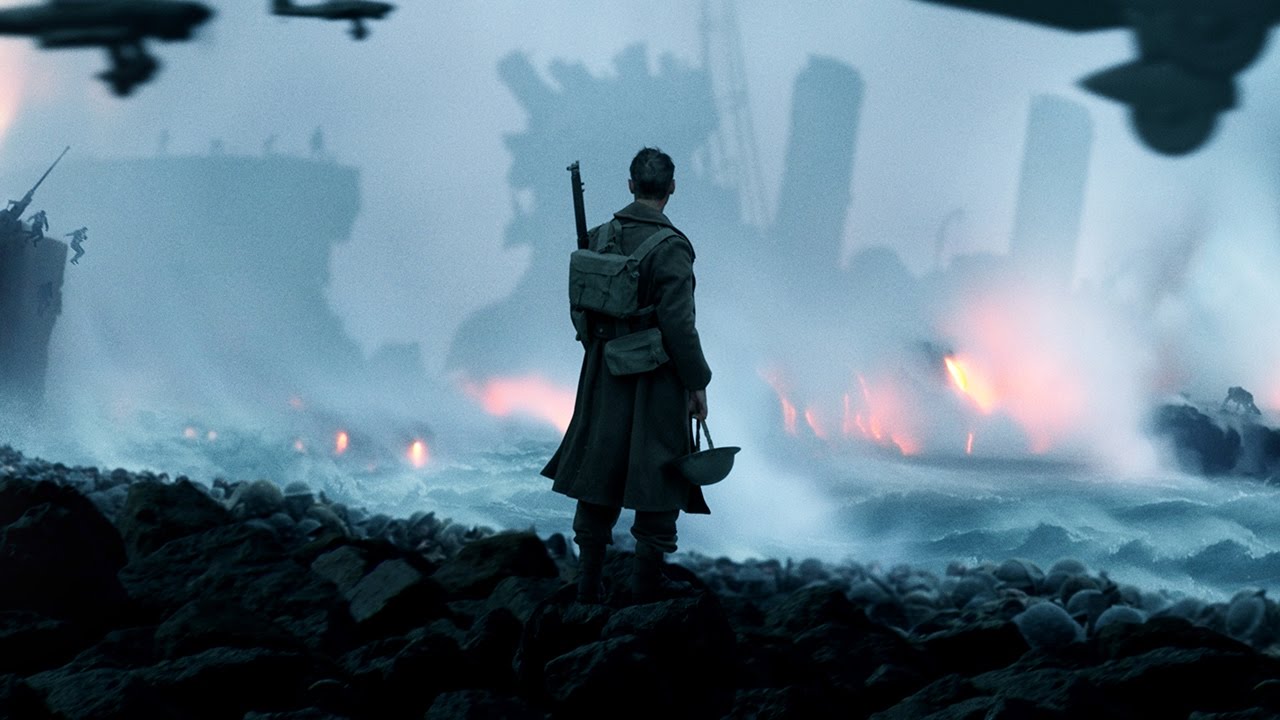Dunkirk directed by Christopher Nolan. Image courtesy of Warner Bros. Pictures.
Christopher Nolan has been hailed as a cinematic genius in some quarters. Memento boldly announced his arrival with its inverted timeline that still managed to make sense while delivering a satisfying narrative pay-off. The Dark Knight is more or less the gold standard against which all other comic book movies are held. Inception dazzled us with its mind-bending world about a mind-bending world. Interstellar taught us that future humans will somehow use a book case to teach us that the power of love can change space-time.
Wait... what?
Interstellar knocked some of the shine off Nolan, leaving viewers to gaze at one another and wonder: What the fuck was he trying to tell us in that movie? And not in a good way, where a movie prods and pokes at you to think deeply about humanity and ask what it is trying to tell you about the meaning of life. No, this movie made you wonder: Did Christopher Nolan really just try and make a point about human existence using an inter-dimensional space library?
For those who had observed his previous films carefully, this was not much of a shock. Nolan has always been a visual master, creating indelible, beautiful, haunting images. But his films have also always masqueraded as something they are not, which is deep and meditative treatises on the nature of man and reality. They are not dumb or simple films, but they are not as deep as conventional wisdom sometimes indicates. Because of its clever construction, Memento is pretty effective at obliquely questioning the nature of reality, time and perception. But the Dark Knight is hardly a nuanced examination of vigilante justice and social decay, or the chaotic forces embedded in human nature that need to be controlled. It tried to pass itself off as such, but in reality it's a movie about imaginative comic book characters - including a madman dressed like a bat - beating the shit out of each other in wildly over-the-top ways. A fun movie, for sure. But hardly a piercing referendum on the nature of law and order in society.
Inception was likewise buzzed about for interrogating the nature of reality, but it was only a surface interrogation, more concerned with visually folding Paris in on itself than with plumbing any kind of real psychological depths and coming up with answers. Don't get me wrong. These are all very good movies, and I enjoy them for what they are. But many people have been quick to put Nolan in the same category as, say, Stanley Kubrick and that just won't fly with me. Incidentally, when Nolan most directly aped Kubrick with Interstellar, that is when the mustard came off the hot dog a bit and people started to sit up and take notice.
Which is why Dunkirk is such a genius piece of filmmaking. Nolan, whether consciously or not, pulls back from the stuff he is not so good at (the somewhat forced attempts to capture an ineffable truth about humanity and reality) and focuses on what he is excellent at - creating pure visual cinema. And in doing so, ironically, he created a film that captures some ineffable truths about humanity and the world we live in.
The movie is sparse. It tells three intersecting stories (this being Nolan he simply couldn't resist some temporal shenanigans, but it actually works pretty well) that take place during the evacuation of Dunkirk. These three disparate threads take place on the beach, in the air, and on a boat and they meet up and cross over in various ways that aren't all that important. What is important is the way the stories are told. There is very little dialogue in this movie. Some characters don't have names, and none of them have arcs. That is because the film is a snapshot of a place and time, populated by people who were simply there during the events of the film. We don't need their back stories or redemptive character arcs (although Tom Hardy just can't help being a bit heroic because, well, he's Tom Hardy). The characters are simply there due to an accident of time and circumstance and history, experiencing these events. And we, the audience, experience these events with them.
The movie is, fundamentally, experiential. Which is good, because that is Nolan's strength. He is a master at creating visually immersive and striking imagery. The film is overflowing with absolutely arresting visuals, and scenes expertly packed with tension. You feel the pressure and the fear, in no small part because of the soundtrack. For once, the overly loud sound mix works to help make you feel off-kilter (the sound of bombs exploding on the beach will actually hurt your ear drums), and the score is also specifically structured to make you feel a haunting sense of unease, as explained in this fun video. All of this comes together to thrust you into a fiendishly desperate and claustrophobic environment and make you feel, as least somewhat, the terror of annihilation and the better angels of our nature that met the challenges of that day in their own ways.
This is why the movie is so good. Unlike some of his past movies, it doesn't try so hard to reach for deep meaning. Instead, it just unfolds as a piece of pure visual cinema and the meaning emerges organically from that. Which, in my mind, actually makes this film earn the title of masterpiece.



